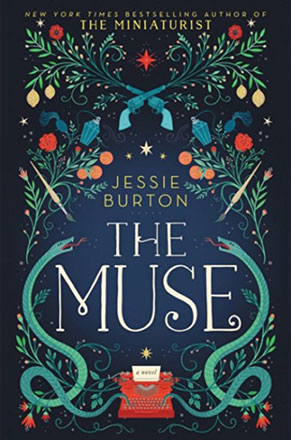The Muse
Jessie Burton
London: Picador, 2016
Pp. 445
The drama in Jessie Burton’s novel, “The Muse”, has many sources: The Spanish Civil War is brewing, while there are ominous signs of fascism’s forward march in other parts of Europe. The passion for art on the part of several characters drives them to extraordinary behaviour. Illicit affairs, including a mother and daughter loving the same man, have dangerous potential, while many characters harbour explosive secrets. There is much romance and many betrayals, some intentional, some accidental.
Yet, at the beginning, one doesn’t sense this degree of drama as the narrative shifts between two young women, three decades apart. Odelle Bastien, who immigrated to London from Trinidad five years before, describes her frustrations. Everywhere she goes, she is met by preconceived notions, some outright racist, which keep her from fitting in and from getting jobs for which she is qualified.
Well-educated and an aspiring writer, she has trouble finding British citizens who are as well versed in English literature as she is. All in all, London is not the paradise that she was raised to expect, but in typical immigrant fashion, she does not write about her disappointments to her mother back in Trinidad, who did all she could to send her daughter to a better life in Britain.
However, just as the story opens in 1967, Odelle lands a job as a secretary in an art gallery and meets the eccentric Marjorie Quick who recognises her talent. This opens up new opportunities for her, but in basic ways, her outlook on life is already set. “I was — both by circumstance and nature — a migrant in this world, and my lived experience had long become a state of mind.” (p. 171)
As the novel progresses, one discovers that several of the characters could claim the same.
While Odelle has been held back by racism, Olive Schloss, the subject of the counterpoised narrative, suffers from sexism. She is an aspiring painter, but her talent is ignored by her father, Harold, an Austrian art dealer who goes to great lengths to promote male artists, but views women as lacking in the needed vision. Ironically, his blindness to his daughter’s talent unleashes a series of events that drive the plot in unexpected directions.
The Schloss family left London for a Spanish village in 1936, hoping that the change will heal Olive’s English mother, Sarah, who suffers from chronic depression to the point of being suicidal. Though signs of the violent outbreak of the civil war to come are mounting, the members of the Schloss family all find their own reasons to stay. Harold thinks he has discovered a great painter, Isaac Robles, in the village. Sarah also seems to have found a purpose in life, and Olive feels she has found herself in Spain, which becomes more than geography to the family.
Both Odelle and Olive are children of the empire, hailing from its opposite poles. Linking their narratives, which unfold in alternating chapters, is art, one painting in particular, and one character who is only identified at the end. Suspense builds in both plots as does one’s curiosity about what links the two.
Mystery also stems from the fact that several characters reinvent themselves. With her own talents unrecognised, Olive choses to be Robles’s muse, and eventually passes off her paintings as his, imagining she is supporting Spain’s workers and poor for whom Robles advocates. Robles and his sister are emblematic of the contradictions between the conservative rich and the radicalised poor in Spain at that time. As the illegitimate offspring of a man who is loyal to the nobility, they live on the margins of society. When Robles is targeted by the right wing for his political acts, his sister is forced to flee and assume a new identity.
“The Muse” is an exceptional novel in terms of writing technique and themes. Author Jessie Burton has a lot to say about empire, about art and history, about art and love, about women’s situation, about the link between the personal and the political, and about the depth and unpredictability of human emotions, but she weaves her observations into the story so subtly that one does not know one is being instructed. The intricate way in which she structures the story to preserve the mystery and connect the two plots is brilliant, as is her character development. Above all, one learns that there is never a single story, and some things may remain ambiguous for a lifetime or more.
